Tree change: Proof Australia is a nation of tree and sea changers
Australians are fleeing cities at unprecedented rates and new research confirms the regional migration is COVID-19 inspired and far from a fleeting trend.
Home
Don't miss out on the headlines from Home. Followed categories will be added to My News.
This is the fourth and final part of our special series Australian Homes during COVID.
Part one: How we ditched a useless yard for a family oasis
Part two: Making the most of smart home tech
Part three: Why small spaces are the next big thing
Australians are fleeing cities at unprecedented rates and new research confirms the regional migration is COVID-19 inspired and far from a fleeting trend.
“The data shows that for the June and September 2020 quarters, we’ve seen the highest levels of movement out of capital cities and into regional areas ever recorded,” says Nerida Conisbee, chief economist for property market experts REA Group.
“And by a long shot. The level of movement is quite extraordinary.”
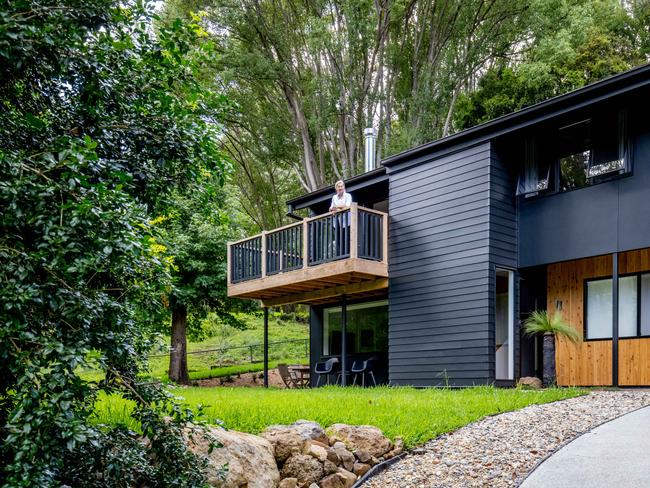
Capital cities around Australia experienced a net loss of 11,200 people from internal migration in the three months to the end of September, the largest quarterly loss on record. And those of us who haven’t moved yet seem to be considering it.
In the second half of 2020, views per listing for regional properties on realestate.com.au jumped a whopping 44 per cent, compared to 16 per cent for the capital cities. And as house prices in regional areas continue to climb due to the intense competition for properties, the yearning for a country life shows no sign of abating.
There is a perfect storm of reasons that explain why we are swapping the CBD for the country and the coast. The most obvious is the fact that the pandemic made many companies realise that a largely work-from-home workforce is a viable way to run a business.
“As soon as we decoupled from the office and found we could work from home, people began realising that there’s more affordability, liveability and even employability in the regions,” says demographer and social analyst Mark McCrindle.
“Suddenly an exodus was on.”
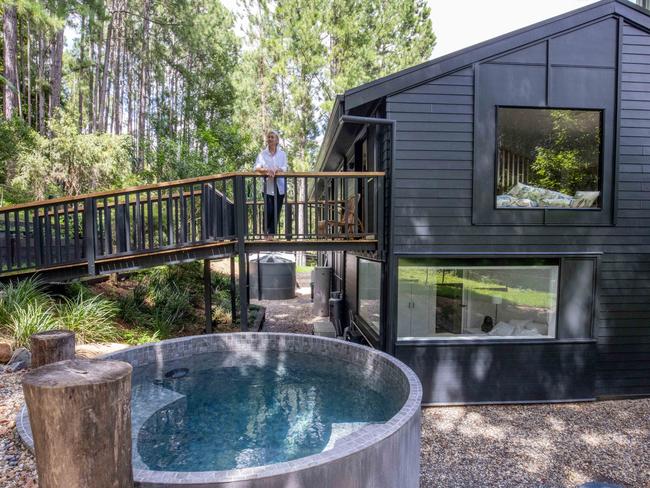
Record low interest rates and high rates of savings (thanks, in part, to our inability to spend up big on overseas holidays) mean more people have the capacity to buy homes outside of the city, perhaps as a holiday home at first and then, potentially, as somewhere to put down permanent roots.
The question, of course, is whether the trend will last. It’s possible we’ll see a bit of “tree change bounce back” – where people return to the cities – after international borders reopen, the pandemic passes and companies decide they want to see more of their workforce face-to-face.
But McCrindle predicts that, for the most part, especially for people who have moved near or close to the larger regional centres, our new country and coastal lifestyles are here to stay.
“The regional cities of today offer all you can get in the capital cities with a few million less people and less of the downsides,” he says.
“They have universities, independent schools, cafe culture, NBN and transport hubs.” All that plus fresh air, nature and a slower pace of life without a traffic jam or tolls in sight. What’s not to love?
NO TREE CHANGE REGRETS
Tree changer Linsey Bamping moved out of the city to the Currumbin Valley:
“I moved from a small apartment in the city to a two-storey, four-bedroom piece of paradise in the Currumbin Valley, in the Gold Coast hinterland, in October, 2020.
I’d been imagining life out of the city for years but I think COVID helped me to really focus on what matters and I decided to make my dream a reality.
Originally I’d considered Byron Bay, I have family there, but my niece suggested I look at the Gold Coast. I turned up to look at this house when it had been raining and flooding but it didn’t matter. It was magical.
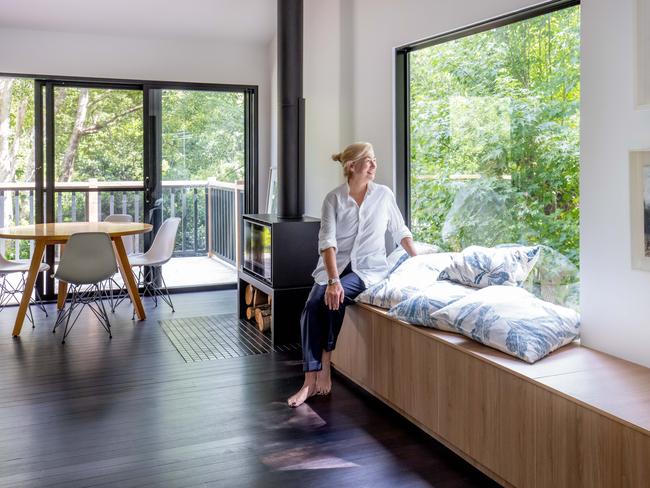
The thing I remember most was a feeling of nature enveloping the house; there were bush orchids spilling out from a gum tree and a beautiful liquid amber next to the house, and I couldn’t see another person or house anywhere. I just thought ‘Oh!’ And I’ve been thinking ‘Oh!’ every day since I moved here. I don’t think I’ll ever stop pinching myself. It’s just so beautiful.
Instead of a wardrobe of shoes, I now have a wardrobe of things from Bunnings, like wheelbarrows and tools.
I don’t have a regular garbage pick up like I did in Sydney. I take any rubbish to the garbage depot myself so I’ve become more conscious about purchasing and packaging.
There are lots of unexpected visitors: a peacock I call Hugh – after Hugh Hefner – wanders the garden with his five girls who keep him very busy.
A couple of times I’ve woken up to the chomping sound of the neighbours’ cows in the garden. But the most striking surprise to me is how genuinely welcoming the neighbours have been: their generosity, their advice and their friendly faces. I feel very safe and nurtured here, cocooned almost.
My only regret is that I didn’t move sooner.”
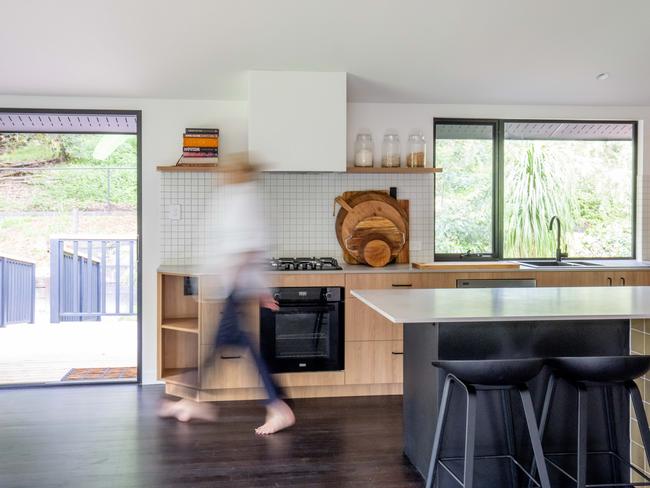
LEAVING THE CITY BEHIND
Tanya Harkness and her family don’t know what city life is anymore.
“We made the move from the city to Apollo Bay almost a decade ago. Josh and Tashi were eight and four years old at the time and we felt we wanted a slightly different lifestyle for our children – one that was more attuned to nature and more focused on community.
I love the fact we are surrounded by nature and that we are so much more active in our environment. The other aspect is the community. We are lucky to live in a town that has an activity community with a strong sense of connection. For me, it’s peaceful, the people are genuinely connected and our house itself is light and roomy – these are the things we thrive on. For others considering the move, the first thing I would say is to be wary of bringing a city mentality with you.
There’s a tendency to look down on the regional areas, which tend to have their own dynamic and function well within that dynamic. You can’t bring that attitude with you and expect to thrive.
When you do arrive, take time to look around, understand how the community works and engage with the community as much as possible. Get involved with everything you can – the fact is the more you put in, the more you get out. Spread yourself around as much as possible.
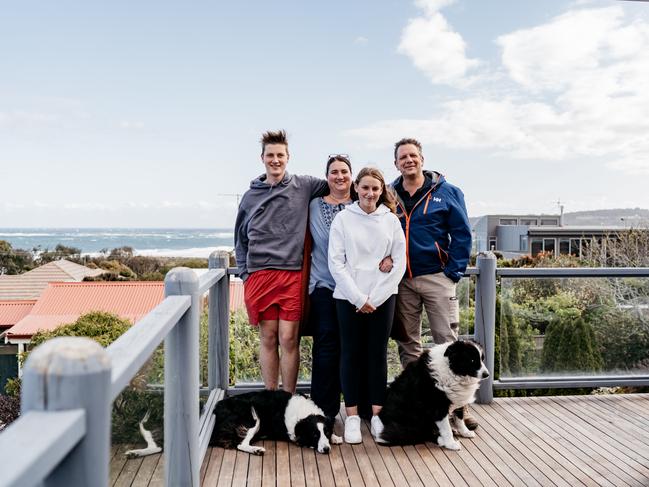
It’s easier if you have children in school because you have a pathway to meeting people, but if you don’t, then put your hand up for everything. Get involved in sport, arts or community pursuits, that way you’ll meet a broader cross section of people.
There’s definitely a different quality of life here and we love it so much. You would have to drag me kicking and screaming back to the city now.
Dr Tanya Harkness and Anthony Alfirenko, with son Josh, 17, and daughter Tashi, 13, and dogs Archie and Cooper.
For more tips on moving to regional Australia visit wattleroad.com.au
FIVE THINGS WE LEARNED AFTER LEAVING THE CITY
1. People won’t come and visit as often as you think. To maintain relationships you are likely going to have to travel back to where you came from.
2. We have so much extra time in the day, mainly because we’re not spending so much time in traffic.
3. We spend more time outside. It has become so integrated in our daily life which we love.
4. It’s so safe here. You can let your kids play at the park by themselves. Ours are always outside and we’re not always on the lookout.
5. When you can step away from expectations and have less stress, you enjoy life so much more.
More Coverage
Originally published as Tree change: Proof Australia is a nation of tree and sea changers




